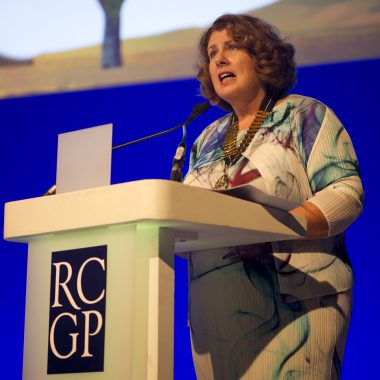Pharmacists within general practice could help lift GP burden, says RCGP chair

Pharmacists should be employed by practices to perform tasks like medicine reviews and help relieve some of GPs’ workload until new trainees can enter the profession, the RCGP has said.
Speaking at the Best Practice conference in Birmingham yesterday, the college’s chair Dr Maureen Baker said she was very interested in new roles in general practice to increase its capacity.
Debating alongside representatives from practice nursing and pharmacy about whether the NHS needed 10,000 more GPs, Dr Baker said new roles were needed in the immediate future but increasing the number of GPs was still vital.
She told delegates: ‘I’m very interested, as well, in the potential of other new roles, like for instance pharmacists isn’t new, pharmacists in general practice probably is.
‘There are other new roles as well that we can explore, basically we’re not going to get a significant number of new GPs much before three or four years on, so we do need to consider that.’
She added: ‘I spent hours this week doing medication review for patients, somebody whose kidney functions are deteriorating, “what’s safe, what’s not safe? That’s hugely time consuming, and that’s just one example.
‘There are pharmacy skills out there, and let’s see quick, safe ways to get these skills into general practice. And let’s look to see what other roles we can design, that will support GPs, support nurses, and are quick to train.
‘We need to do this within the next year, 18 months, to keep general practice going until we get more GPs and other highly skilled professionals online.’
Earlier this month, Pulse revealed the college was lobbying ministers for a similar scheme to introduce ‘medical assistants’ who would help GPs with their administrative burden and free up more time to see patients.
In his keynote speech at the Best Practice conference, health secretary Jeremy Hunt revealed that the Department of Health were now working on the scheme with the RCGP.
He said: ‘Training a GP takes time, and we have to do things in the short term to improve capacity… being innovative in our use of physicians assistants or medical assistants – as is pretty standard practice for general practice in the United States – and we’re looking at it at the moment with the RCGP.’
Yesterday, Pulse revealed that the workforce crisis was unlikely to abate anytime soon after Health Education England admitted 12% of GP training places remain unfilled, despite launching an unprecedented third round of GP recruitment.
Pulse October survey
Take our July 2025 survey to potentially win £1.000 worth of tokens











